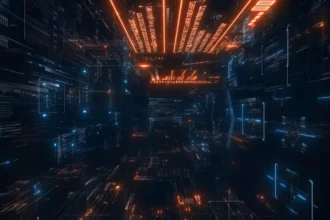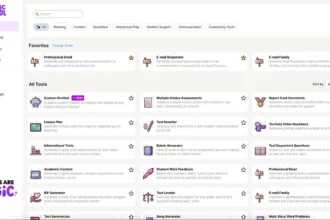Table of Contents
ToggleNew Data Confirms It: AI Is Taking Human Jobs
Recent data strongly indicates AI is replacing human jobs, particularly in white-collar sectors. Companies are shifting hiring policies to prioritize AI solutions over human labor. This trend emerges from multiple studies and corporate strategies signaling a clear impact on the job market.
Corporate Decisions to Replace Humans with AI
- Shopify’s CEO enforces a new rule: before requesting more staff, departments must prove AI cannot perform the tasks as well as humans.
- Duolingo plans to phase out contractors progressively, substituting AI systems for human workers.
- Many employers report reducing hiring due to AI capabilities, reflecting cautious workforce growth.
These policies reveal a corporate mindset increasingly confident in AI’s efficiency and cost-effectiveness. Employers aim to limit human hires where AI can operate with equal or better performance.
Real-Time Data Analysis on AI’s Impact on the Job Market
Revelio Labs conducted a comprehensive study led by economist Zanele Munyikwa. The research involved analyzing online job postings to identify tasks that AI can perform or assist with. Over the last three years, tasks suited for AI in job ads declined by 19%. This drop mostly results from companies hiring fewer workers in AI-executable roles.
| Job Exposure to AI | Hiring Decline Since 2022 |
|---|---|
| High-Exposure Roles (many AI-doable tasks) | 31% |
| Low-Exposure Roles (few AI-doable tasks) | 25% |
The release of ChatGPT in 2022 marks a significant breakpoint. Job openings dipped across all categories, but the steepest fall occurred in high AI-exposure jobs.
Jobs Most and Least Exposed to AI
AI’s impact is uneven across occupations:
- Highly exposed roles: database administrators, IT specialists, information security analysts, data engineers face major job reductions.
- Less exposed roles: jobs requiring physical presence like restaurant managers, foremen, and mechanics remain relatively safe.
Additional Research Confirms AI’s Early Impact
A joint study by Washington University and NYU assessed freelancers’ market responses post-ChatGPT.
- Writing-related freelance jobs declined by 2% on Upwork.
- Freelancers in knowledge work saw earnings drop by 5.2% monthly.
- These early effects suggest generative AI lowers demand for varied knowledge workers.
Uncertainty and Risks of AI Replacing Human Jobs
Zanele Munyikwa notes the current AI may not fully replicate all human white-collar work. Employers may overestimate AI’s capabilities.
- Potential quality loss or diminished creativity could undermine AI-driven hiring cuts.
- The longevity of hiring slowdowns depends on AI’s actual performance and impact on business outcomes.
Companies Reverting AI Hiring Cuts
Klarna provides a case study of AI-induced hiring freezes followed by reversals.
- Klarna claimed AI assistants replaced 700 full-time agents.
- Recently, they resumed hiring human agents, admitting AI-led cost reductions lowered customer service quality.
- The CEO emphasized human support remains crucial for customer trust and service excellence.
Continuing Trends Despite Some Backlashes
Tech leaders persistently favor reduced staff via AI automation due to employee management challenges.
AI tools improve monthly, encouraging firms to continue workforce downsizing efforts.
The future outlook for white-collar employment is uncertain but likely challenging, given ongoing AI progress.
Klarna still plans to reduce its workforce by 500 employees over the next year and predicts faster cuts as AI technologies advance.
Key Takeaways
- AI increasingly replaces human labor in white-collar and tech-heavy fields.
- Companies set policies prioritizing AI over new human hires.
- Job postings show a notable downturn for roles with many AI-executable tasks.
- Freelance knowledge work sees shrinking opportunities and earnings due to AI.
- AI’s complete effectiveness remains uncertain; its impact on quality and creativity is under scrutiny.
- Some companies reverse AI hiring cuts to maintain service quality.
- AI development trends suggest continued pressure on human employment in affected sectors.
New Data Confirms It: AI Is Taking Human Jobs
Is AI really taking our jobs? The short answer: yes, it is. But before you panic, let’s dig into what the latest data and corporate decisions reveal about this shift. We’ve entered an era where companies don’t just ponder if AI can help — they actively replace humans with it. Ready to see what’s happening behind the scenes?
Corporate Decisions Speak Volumes
Big tech leaders are setting new rules. Shopify’s CEO, for example, demands any team asking for more people must first prove AI can’t handle the tasks. Imagine needing to argue why a human should get the job — that’s the future of staffing!
Duolingo has taken this further. They plan to phase out contractors and rely more on AI. And guess what? Employers overall are slowing down their hiring because AI is stepping in. It’s not just talk; it’s happening, and fast.
Real-Time Data on AI’s Impact
Revelio Labs economist Zanele Munyikwa analyzed job postings to see how many include tasks AI can do. Over the past three years, postings for AI-doable jobs dropped by 19%. That’s nearly one-fifth fewer job openings for roles AI can handle.
The biggest hit? Roles with a high degree of AI exposure, where tasks and duties line up neatly with AI capabilities, saw a 31% decline since ChatGPT’s launch in 2022. Even less exposed roles dropped by 25%, but they’re safer. This data suggests companies are selectively shrinking staff in AI-replaceable roles.
Who’s Most at Risk? And Who’s Not?
If you manage databases, work in IT, focus on information security, or build data pipelines, watch out! These jobs face the greatest AI exposure. Tasks once thought complex and human-only are now AI-friendly.
On the flip side, hands-on roles like restaurant managers, foremen, and mechanics remain largely AI-resistant. Physical presence and on-the-spot judgement still favor human workers.
Freelancers Feeling the Squeeze
Study this: Freelancers in writing-related fields lost 2% of jobs on platforms like Upwork after ChatGPT’s debut, with earnings dropping over 5%. AI’s generative power is cutting into the demand for knowledge work—especially in writing—right now.
So, if you’re freelancing with words, you might need a backup plan — or a clever way to partner with AI, not compete against it.
The Uncertain Future: Caution Ahead
Despite the rush to hand over tasks to AI, experts urge caution. Revelio Labs warns that current AI might not actually deliver what employers expect. Some CEOs might soon realize cutting human staff hurt work quality or creativity. The big question: will the savings from fewer hires come at a cost to innovation and output?
Klarna’s story is a perfect example. They froze hiring after an AI assistant replaced 700 agents. But they’re now hiring humans again because AI-driven cost cuts caused a drop in quality. Klarna’s CEO stresses clarity — customers must know a human is always involved. Investing in human support remains essential.
Why Do Tech CEOs Keep Betting on AI?
Tech leaders share a common hope: fewer employees means fewer complaints and less downtime. After all, AI doesn’t need coffee breaks or vacations. And yes, AI tools improve almost monthly, empowering companies to trim the workforce even more.
The outlook is clear. Unless something dramatic shifts, white-collar jobs face a challenging future. Klarna expects another 500 job cuts soon and foresees faster reductions as AI tech gets sharper.
What Does This Mean for You?
Are humans doomed to become obsolete? Not exactly, but understanding AI’s limits and strengths is key. Jobs heavy in repetitive, technical tasks are most at risk. Meanwhile, those requiring empathy, complex judgment, or physical presence seem safer — at least for now.
If you work in a high-exposure role, this might be the moment to pivot. Learn skills that AI can’t easily replicate, like creative problem solving or interpersonal communication.
Companies are experimenting—some rush ahead with AI replacements, others pull back after realizing quality matters too much. The dance between man and machine is far from settled.
In Conclusion: AI Is Here, Jobs Are Changing
New data makes it crystal clear—AI is not just a tool but a hiring gatekeeper. It’s replacing human jobs faster in roles it can perform well. Freelancers and tech workers feel the pinch more than most. But there’s room for balance and human uniqueness.
So, where do you stand? Embrace AI’s power as an assistant, sharpen irreplaceable human skills, and keep an eye on how your industry adapts. AI might be here to stay, but the human touch still counts.
How is AI changing corporate hiring policies?
Some CEOs now require proof that AI cannot do a job before allowing new hires. Companies like Shopify and Duolingo are actively replacing contractors and roles with AI tools. Overall, fewer people are being hired for AI-exposed jobs.
Which jobs are most vulnerable to AI replacement?
Roles involving tech tasks face the highest risk. Database admins, IT specialists, data engineers, and information security professionals see the biggest decline. In contrast, hands-on jobs like mechanics and restaurant managers remain less affected.
What does recent data say about AI’s effect on job openings?
Studies show a 19% drop in jobs with AI-doable tasks over three years. High-exposure roles experienced a 31% hiring decline since ChatGPT’s release. Employers are cutting jobs where AI can perform or assist work efficiently.
Are AI replacements affecting job quality and company decisions?
Companies like Klarna reversed some AI-driven hiring cuts after noticing quality drops. Experts warn that AI might not fully match human creativity or thoroughness, which could influence future hiring trends and productivity.
What is the outlook for white-collar jobs given current AI advances?
With AI improving monthly, many tech CEOs favor fewer employees. White-collar roles, especially those with AI-doable tasks, face ongoing declines. Some firms plan further workforce reductions as AI capabilities grow.




